Brazil's Partido Novo Challenges X Ban, Sparking Free Speech Debate
Conservative party seeks to overturn Supreme Court ban on X platform in Brazil, citing freedom of expression. Legal battle intensifies as Elon Musk accuses judge of censorship, while government backs the decision.

In a significant development in Brazil's ongoing debate over online freedom of expression, the conservative Partido Novo has initiated legal action to reverse the recent ban on Elon Musk's X platform. This move comes in response to Supreme Court Justice Alexandre de Moraes' decision last week to block the social media site in Brazil, the platform's sixth-largest market.
The ban was implemented after X allegedly failed to comply with orders to block certain accounts accused of spreading misinformation and hate speech. Justice Moraes, who has been at the center of this controversy, also froze the assets of Musk's Starlink satellite broadband company, potentially to cover fines owed by X.
Jonathan Mariano, a federal prosecutor and Partido Novo candidate, emphasized the party's stance: "This is about freedom of expression - we want X back to normal in Brazil." The party's challenge will be reviewed by Justice Kassio Nunes Marques, an appointee of former President Jair Bolsonaro.
This legal battle has broader implications for Brazil's digital landscape. Founded in 2006, X (formerly Twitter) has become a crucial platform for public discourse in the country of over 213 million people. The ban has sparked a heated debate about the balance between combating misinformation and protecting free speech, a right guaranteed by Brazil's 1988 constitution.
Musk, who acquired the platform in a $44 billion deal in October 2022, has been vocal in his opposition to the ban, labeling Justice Moraes a "dictator" and accusing him of censorship. The tech mogul's response has escalated tensions, with X closing its Brazil offices in protest.

President Luiz Inácio Lula da Silva, currently serving his third term, has backed Moraes' decision, stating, "Just because a guy has a lot of money doesn't mean he can disrespect" the law. This support from the highest level of government underscores the political dimensions of the dispute.
Legal experts are divided on the constitutionality of the ban. Vera Chemim, a São Paulo-based constitutional lawyer, argues that the issue should have been debated by all 11 justices of the Supreme Federal Court, not just a panel. She also contends that freezing Starlink's assets violates Brazilian law.
"X and Starlink are tentacles of the same octopus, they form an economic group."
The Brazil Bar Association (OAB), founded in 1930, has also entered the fray, challenging Moraes' order to fine individuals 50,000 reais daily for using VPNs to access X. This adds another layer to the complex legal and ethical questions surrounding internet freedom in Brazil.
As this situation unfolds, it highlights the ongoing challenges in regulating online spaces while preserving democratic principles. The outcome of this case could have far-reaching implications for digital rights and the power dynamics between global tech companies and national governments.


































